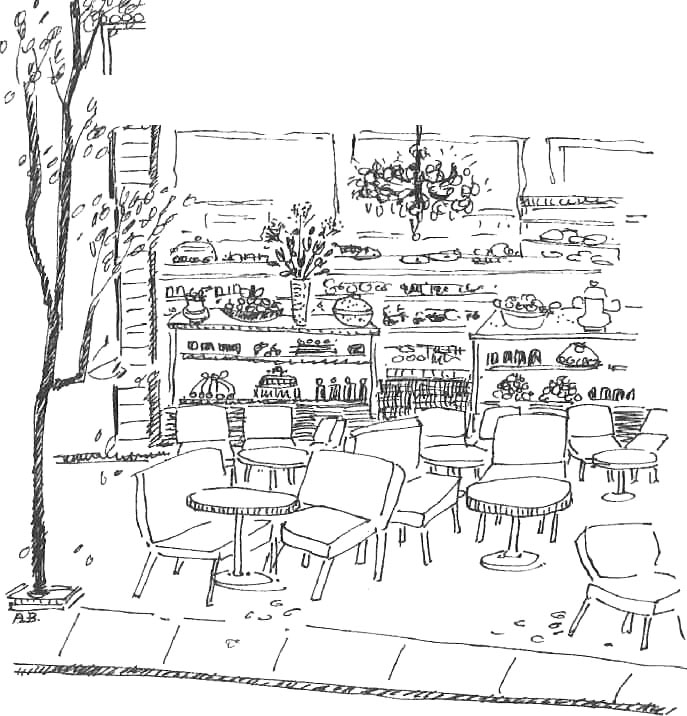
I must ask them to be patient once again while I dwell on some of the aspects of Greek life with which they will be coming into contact.
Taxis: “Taxis” is a Greek word that means “order” or “class”. Greek cab drivers, however, seem to be unaware of this definition since their taxis are neither orderly nor classy. The reason for this is probably because they never stop. They always appear to be speeding by, occupied by blowzy females or seedy-looking men who should really be travelling by bus. The cabbies have also hit on the novel system of picking up extra passengers on the way and making them pay the full fare instead of sharing it with the blowzy female or the seedy-looking man already inside. The result is that they are constantly on the go and if a door handle drops off, it stays that way, and if a fender gets dented, it stays dented because there is no time to stop for repairs. Indeed, the only thing that might prompt a Greek cabbie to stop and fix anything is when something goes wrong with his radio or cassette player. Most of them find it physically impossible to do their job unaccompanied by the strains of the principal aria from some obscure Anatolian opera.
Quite the opposite of the bustling grey taxis are the hire cars — sleek, black limousines of ancient vintage that stand parked along Amerikis Street behind the Grande Bretagne Hotel. They never seem to go anywhere and their drivers look completely forlorn as they whisk the dust off their gleaming vehicles or wash the wheels with a bucket of water and a sponge for the umpteenth time in a day. I happened to engage one of them in the summer of 1955 for some American friends. I have never had the opportunity of throwing any more business his way since then. Yet, every time I have walked past his limousine on Amerikis Street for the last twenty-three years, he has nodded to me politely and bid me good-day with a note of desperate hope in his voice.

Provincial Hotels: The owners of provincial hotels in Greece are in a constant state of seething anger. This is caused by the fact that they are classified by the National Tourist Organization (EOT) according to the facilities they provide and can only charge the fixed rates decreed by EOT. As a result, they cannot get rich overnight as they had hoped, and they take it out on their clients in various subtle ways. One of these is to keep the bathroom water slightly tepid so that it is never hot enough for a bath. And to guard against anyone hardy enough to take a bath in lukewarm water, the drain plug is invariably missing. Another tactic is to provide a continental breakfast consisting of two dry rusks, a piece of stale tea-cake and barely enough coffee or tea for one cup. But the time of year when they really get even with everyone is the winter. Their hotels are maintained at the temperature of an ice box and if anyone complains, they assume an expression of extreme sorrow and explain that just this morning the boiler broke down and the repair man can’t get any spare parts for a week. For dinner they can only give you fried eggs and a salad because the cook went to visit his sick mother and is snowbound in a village thirty kilometres away. After that, they lose interest in you completely and gather round a television set in the hotel lounge with assorted relatives, the village mayor, policeman and public notary until the national anthem sends them to bed at 12:30 am.
Television: Greek television consists almost entirely of commercials and news broadcasts. Some popular American or British shows are sandwiched in between but the Greek shows are gradually dying out as the result of a long actors’ strike. They are being replaced by documentaries on the “Fall of Okinawa” or the “Battle of Britain”.
The commercials come in waves. Sometimes there is a solid week of detergents with ultra-plebeian housewives proclaiming they have switched to Omo, Tide, Essex or Dixan Polyprogramme (whatever that may mean) because it washes their husbands’ collars whiter — an obvious lie because their husbands assuredly have never worn a white collar since their wedding day. Then there is a solid week of “feminine hygiene products” with coy females flinging themselves all over the screen with gay abandon because they have found the answer to a maiden’s prayer. Next comes a solid week of macaroni featuring happy families with disgusting table manners slurping spaghetti and talking with their mouths full as they extol the virtues of various pastas. Perhaps more noisome than the spaghetti slurpers are small, pasty-faced children stuffing their faces with chocolate-covered wafer biscuits or the utterly revolting sight of a father kissing his baby’s bottom.
The news broadcasts on both channels vie with each other in covering every aspect of the latest developments in Greece’s bid to enter the Common Market. The comings and goings of minor functionaries between Brussels and Athens are filmed and reported with a thoroughness that is equalled only by the coverage given to the comings and goings of Prime Minister Constantine Karamanlis. After having stupefied their audiences in this manner, the newscasters cover world events very briefly and then embark on another tedious round of films showing the swearing-in ceremonies of police cadets, the “cutting of the New Year’s cake” parties of the association of employees of the National Mint and kindred groups, which go on well into March, or the opening speech of the Undersecretary of Health at the annual congress of dental technicians of Aetolo-Acarnania. They are followed by the weather report with a meteorologist who points at complicated charts and tells us that it rained today and that tomorrow will be marked by “weather phenomena”, whatever that may mean.
The only good thing about the news is that it is always aired on time. And it is the only one of the scheduled programs that enjoys this privilege. Rumour has it that the Prime Minister switched on his set once at midnight to see the late news and was enraged by having to wait for twenty minutes until the end of an inane quiz show and ten minutes of commercials before the news came on half an hour late. He then gave a piece of his mind to the person in charge of the TV station and ever since the news has come on the dot.
But in spite of its shortcomings, Greek television is to be thanked for performing what may be the greatest of all services to the people of this country. It has made us aware for the first time in our long and glorious history of the horrors of body odour. Subtle commercials showing a girl and two men in the close confines of an elevator with the men wrinkling their noses at the girl and saying, “Someone should tell her about Rexona” as she walks out, have had the salubrious effect of eliminating an element in the Greek atmosphere that, along with garlic, was once as all-pervading as carbon monoxide is today.







